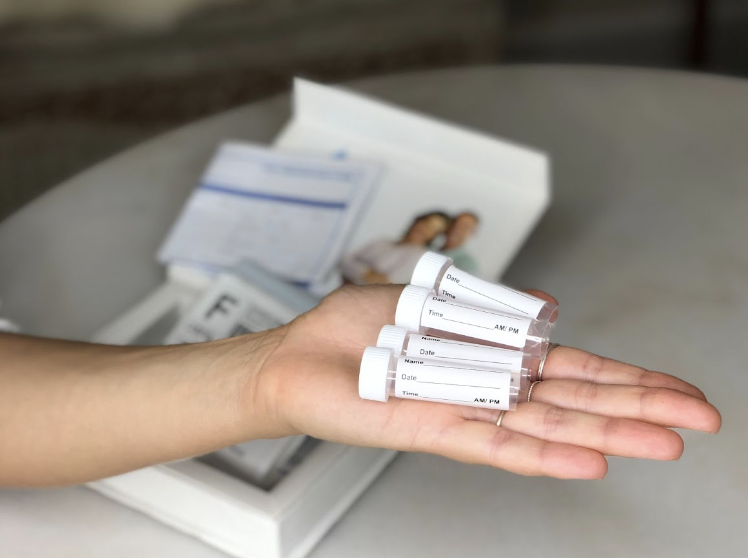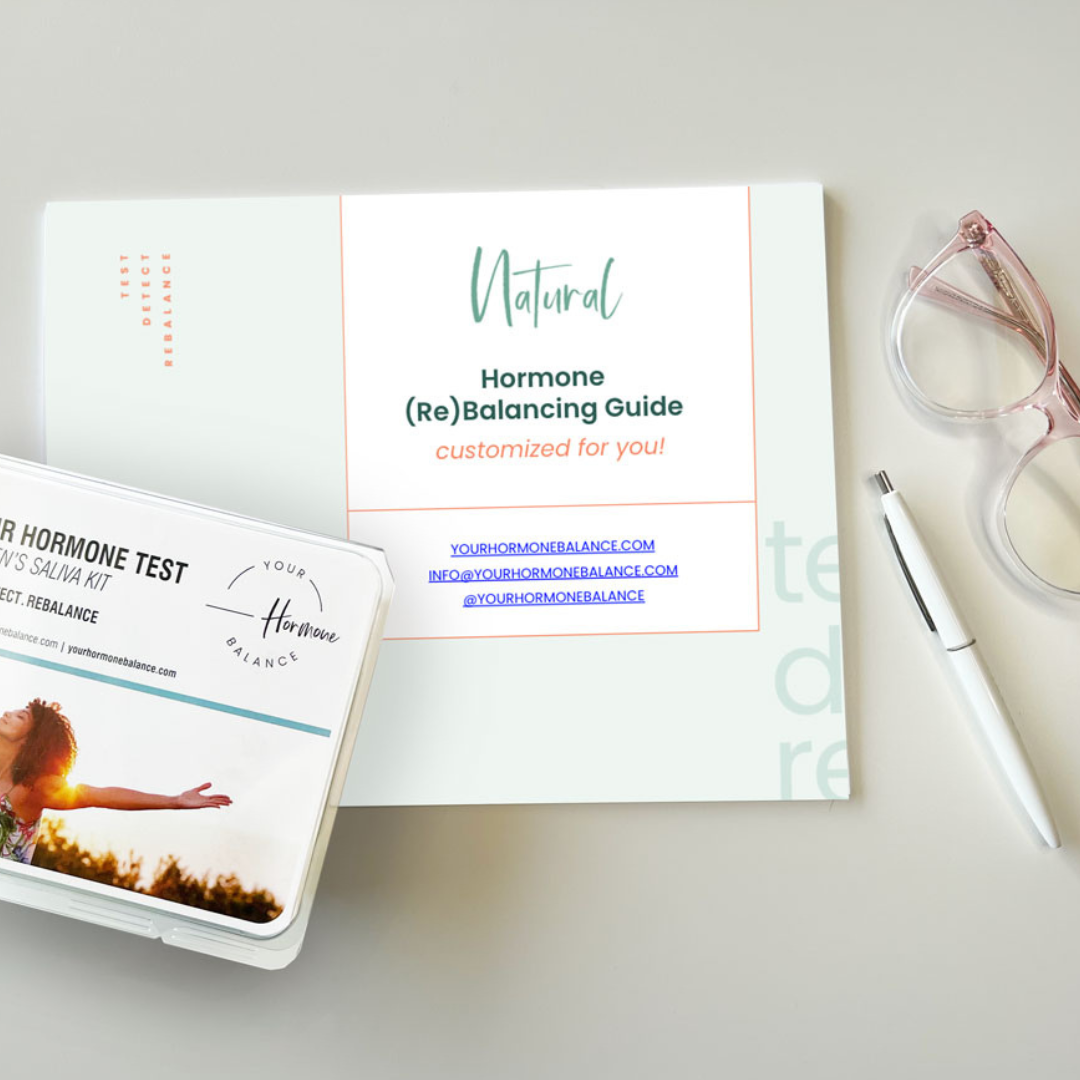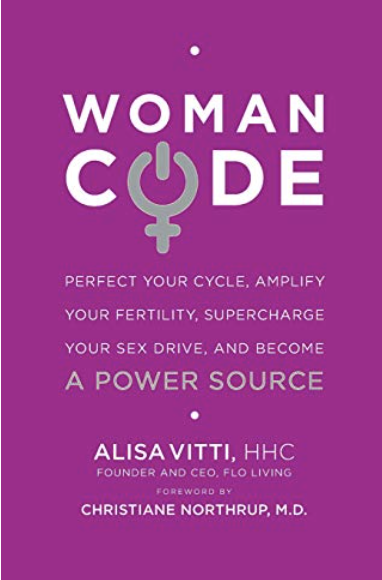
Whether you’re looking to get pregnant now -or- are interested in prepping and priming your body for a future pregnancy, we highly suggest digging into the fertility optimizing strategies outlined in this blog! This includes an overview of the main hormone imbalances and hormonal conditions linked to infertility / difficulty get pregnant.
The WHO organization's 2023 report states that 1 in 6 couples globally struggle with infertility (defined as the "inability to get pregnant after 1+ years of unprotected sex") which can be due to male AND female fertility factors, which we'll review in this blog.
Infertility can be an emotional rollercoaster filled with highs and lows and frustrations with your own body, but it's important to know that you’re not alone and the word "infertility" is not always accurate OR final. Doctors often make discouraging statements about a woman’s chances of getting pregnant BEFORE getting a clear picture of what’s going on with her hormonally and BEFORE diving into her lifestyle or nutritional habits. (But how can we blame them? The western “for-profit” medical system incentivizes doctors to focus on prescribing, surgery and insurance-covered testing, NOT to examine root-causes or approach symptoms naturally...which is why we suggest working with a functional medicine doctor whenever possible!).
But when it comes to getting pregnant, staying pregnant and bringing a healthy baby into the world, the process should always start with hormone testing and a plan to optimize fertility with balanced nutrition, self care/stress management, mindful movement and supportive supplements/herbs (outlined ahead)!
Natural Approaches to Improve Fertility
STEP 1: Test ‘ACTIVE’ Hormone Levels & Address Imbalances
If you've been suffering from persistent symptoms or chronic health issues, including difficulties getting pregnant or miscarriage, TESTING your hormone levels is an integral action step that can be incredibly eye opening to identify root causes and support your next steps.
NOTE: when it comes to fertility challenges, the TYPE of testing matters, as well as the specific hormones measured!

At Your Hormone Balance, we prefer testing the “master hormones” in saliva (Estrogen, Progesterone, “PG/E2 ratio,” Testosterone, DHEA and Cortisol levels- 4 x over the course of 1 day), considered by many experts to be the “gold standard” for assessing adrenal function and a more accurate measure of “bioavailable” or ACTIVE hormone levels – found in the target tissue of the body where hormones do their work!
Meanwhile, standard blood tests (unfortunately the main type provided by traditional doctors / covered by insurance) measure TOTAL hormones, including those still bound to proteins in the bloodstream, which are inactive – and tell us very little about symptoms that are presently being experienced! This is why SO many women come to us after receiving “normal” blood test results (and then sent on their way), even though they feel anything BUT normal! (You can read more about the top reasons we prefer saliva to blood testing HERE. Note: urine /”Dutch”testing, which measures hormone metabolites, is also a more reliable form VS. standard blood tests).

Testing these “master hormone” levels is important for many of the reasons but here are the heavy hitters:
1) Knowing your estrogen levels relative to progesterone (determined by the “pg/e2” ratio) is crucial for assessing whether or not you have adequate amounts of progesterone to balance estrogen. Healthy levels of estrogen and progesterone are important for regular ovulation (you MUST ovulate in order to produce progesterone AND to get pregnant) as well as maintaining a healthy pregnancy!
Progesterone is actually known as THE “pregnancy” hormone, because of its essential role in supporting and maintaining female uterine tissue to allow for conception. While Estrogen (its co-partner in fertility), is the all-important hormone that grows the egg in the ovary, it is progesterone that 'feathers the nest,' preparing the uterus for implantation of a fertilized egg. Particularly during the first trimester, progesterone in adequate amounts is vital to keeping the uterine lining that houses the embryo in place, thus ensuring a healthy pregnancy. When progesterone levels are insufficient to support the pregnancy (due to disruption of ovulation, stress, extreme exercise, diets, nutrient deficiencies etc.), potential risks for miscarriage increase.
The good news is: there are many ways to naturally increase your progesterone levels, which we’ll cover later in this blog!
2) Measuring your active or “free” androgen hormone levels (DHEA and Testosterone) is important for evaluating risks for PCOS and insulin resistance - a leading cause of infertility.
Elevated levels of DHEA and Testosterone are often due to a daily diet high in simple sugars and carbohydrates (packaged foods, baked goods, white breads, pastas, added sugars etc) which raise blood glucose levels and in turn increase insulin levels to help regulate glucose. If insulin levels remain high due to the constant intake of refined carbs and sugars, this triggers the ovaries to churn out higher and higher levels of testosterone and/or DHEA which can result in insulin resistance and associated hormone disorders such as Polycystic Ovarian Syndrome (PCOS), obesity, Type 2 diabetes, and infertility.
Thankfully, lowering high androgen hormones and reversing insulin resistance and PCOS is possible with simple, impactful interventions, especially dietary changes! (PSA: never let a doctor or healthcare professional tell you otherwise.)
3) Measuring cortisol (‘stress’) hormone levels 4 x over the course of one day can indicate if chronic stress is potentially disrupting ovulation and/or contributing to inadequate progesterone production, impacting the ability to conceive.
The adrenal (“stress”) glands are responsible for producing cortisol (along with over 50 hormones), as well as regulating our sleep/wake cycle, blood glucose / insulin levels and maintaining our natural immunities against illness! Normal levels of cortisol are essential for daily functioning, but problematic symptoms start to arise when the adrenal glands work overtime to meet increasing demands for energy, especially during periods of heightened or prolonged stress.
Testing your cortisol levels multiple times throughout the course of one day (morning, noon, evening + night) assesses your adrenal function (how well your adrenals are working for you), and can identify patterns related to your stress, moods, appetite, energy and immunities. Cortisol levels above or below the optimal range (along with relevant symptoms such as fatigue, low energy, cravings, belly fat, frequent illness, trouble sleeping) are often an indication of chronic or persistent stress - which can disrupt ovulation and/or contribute to luteal phase deficiency (which makes pregnancy nearly impossible).
The best approach to optimize cortisol levels includes proper stress management and a plan to strengthen adrenal glands with quality nutrition, sleep, mindful movement and enhancements like adaptogenic herbs (more on this ahead!).

If interested in testing these hormones in saliva and receiving rebalancing education and insights, check out our “build your own rebalancing package.” You’ll also have the option to add on a phone consultation and/or a customized rebalancing guide (including lifestyle/nutrition/supplements based on your unique results and symptoms)!
NOTE: saliva must be collected on a specific day of your cycle (generally day 19, 20 or 21 for 28-30 day cycles; we provide details for longer/shorter + irregular cycles). Those with absent cycles may test any day of the month.
>> TEST FERTILITY SPECIFIC MARKERS
Interested in testing your fertility hormones from home? We’re fans of Modern Fertility's at-home finger prick test which is the same hormone test offered by Reproductive Endocrinologists for a fraction of the price. They test up to 7 hormones (including LH, FSH, AMH, fT4 and prolactin) and deliver the results via comprehensive reports and dashboards! You also get a call with a fertility nurse to chat through your results and have your fertility concerns/questions addressed. Shop the kit here to get $10 off.
NOTE: the blood test is typically collected on day 3 of your period and all information provided by modern fertility is fertility specific (different from the insights and testing the YHB team offers as part of our testing + rebalancing package).

**The more education and information you can get about your unique hormone levels and health, the BETTER! When we aren’t getting the answers or support we need from doctors, we have to become our own health advocates by regularly check in with ourselves / our symptoms, exploring different forms of testing and making intentional lifestyle, diet and stress management changes to rebalance and find relief!**
>> UNDERSTAND THE HORMONALLY LINKED MEDICAL CONDITIONS LINKED TO INFERTILITY:
In addition to hormone imbalances, there are medically recognized hormonal conditions that are often linked to infertility, including:
1) Ovarian Insufficiency: This condition (also known as premature ovarian failure), occurs when the ovaries stop functioning normally and releasing eggs regularly before age 40. In other words, sometimes the ovaries switch on and start producing estrogen and sometimes they don't. Declining ovarian function is the main catalyst for age-related decline in female fertility but it's not the same thing as premature menopause (12+ months without a period). Women with ovarian insufficiency can have irregular periods and even get pregnant (while women with premature menopause cannot).
Causes of ovarian insufficiency are not always known but can be due to autoimmune issues, toxins (cigarette smoke, chemicals, pesticides, chemotherapy, radiation), chronic stress and/or genetic defects.
2) Luteal Phase Deficiency: In some women who struggle with infertility, ovulation may occur normally but levels of progesterone are too low following ovulation (i.e. the luteal phase). This means that even if an egg is fertilized, implantation either does not occur, or if it does, progesterone levels are not high enough to maintain the pregnancy into the first trimester (miscarriage).
The most common root cause of luteal phase deficiency is inadequate progesterone production by the corpus luteum (formed from the ruptured follicle upon ovulation, every cycle), chronic stress with cortisol ups and downs that disrupt ovulation, and/or imbalances of thyroid that can also play a role. This is why we must focus on balancing estrogen and progesterone levels and strengthen the adrenal glands (which regulate cortisol production).
3) Polycystic Ovarian Syndrome (PCOS) is the most common endocrine disorder affecting more than 5 million women in the US alone! It’s one of the leading causes of infertility and conventional medicine often considers it “untreatable” (other than the default prescriptions for contraceptives and/or Metformin).
Despite this, a growing number of experts in the functional medicine space strongly disagree, citing numerous cases of PCOS shown to be 100% reversible through diet and lifestyle interventions, including research-backed herbs and supplements. Thus, it’s important to stand up for yourself and question any doctor who suggests synthetic birth control and/or medications as the ONLY answer for PCOS. (Synthetic birth control disrupts your natural balance of hormones, leading to hormonal imbalances the longer it’s used, including symptoms like weight gain, acne, mood swings and challenges getting pregnant).
As a reminder: high androgen hormones (Testosterone and DHEA) and insulin resistance are often at the root of PCOS - which is closely associated with metabolic syndrome and future risks for developing diabetes and cardiovascular disease. Top symptoms of PCOS include: irregular / absent periods, acne/oily skin, excess facial/body hair, sugar/carb cravings, fatigue, deepening of the voice, thinning hair on the top of the head,weight gain / weight loss resistance/ belly fat.
NOTE: if you’re dealing with any of the aforementioned hormonal conditions and seeking greater support, we highly suggest working with a functional medicine doctor who will focus on getting to the root cause of your condition / symptoms and incorporate traditional and holistic healing modalities into your care.
>> UNDERSTANDING MALE FERTILITY FACTORS:
When it comes to getting pregnant, it's often assumed that it all comes down to the woman but in fact, 40-50% of infertile couples find that male fertility problems (including poor sperm quality, damaged testicles, ejaculation disorders and sterilization), contribute to their inability to conceive naturally. Low sperm count and infertility in men is more prevalent than most couples think which is why it’s important for both parties to get fertility testing and also understand the lifestyle factors that contribute to low sperm count (pesticides in food, EMF’s, alcohol, smoking, stress, plastics etc).
Learn more about how to get tested and lifestyle modifications to support healthy sperm via THIS article which also comes with a free male fertility check-list!
STEP 2: Incorporate Specific Lifestyle & Nutritional Changes to Optimize Fertility
>>TRACK YOUR CYCLE & SIGNS OF OVULATION:
One of our primary suggestions for women who want to get pregnant is to track their cycle regularly and use the fertility awareness method (FAM). Understanding where you are in each of the four phases of your cycle, what symptoms correlate to the different phases, and when you are ovulating is one of the best ways to get in-tune with your body and understand your fertile window.
Note: If you're still using hormonal birth control but hoping to get pregnant in the next 1-2 years, we highly encourage transitioning to a non-hormonal birth control or use tracking apps as soon as possible, to allow time to restore regular cycles and replenish hormone levels naturally.
HOW THE “SYMPTO THERMAL” FERTILITY AWARENESS METHOD WORKS:
Note: this is a specific fertility awareness method which is up to 99.6% with perfect use and 98-99% with typical use. Learning the method takes time as it is completely user dependent so working with a fertility awareness educator (like @nourishedwithnina) can be really helpful for building confidence and increasing accuracy.
STEP 1: Track your cycle length in an app like My Flo, Natural Cycles and/or Temp Drop -OR- using a paper calendar/chart. It can be helpful to use more than one app and/or tracking mechanism to remind yourself to consistently input data and reduce inconsistencies. A normal cycle length is anywhere between about 24-36 days and anything outside of that may be an indicator of a hormonal imbalance that should be investigated further (take our symptom imbalance quiz HERE).

STEP 2: Take your basal body temperature (BBT) every AM, using an app or device like Natural Cycles or Temp Drop to track your BBT with ease. BBT is lower in the first half of the cycle and raises by about .5-1 degree AFTER ovulation which is when progesterone is produced. BBT will remain elevated throughout the rest of the cycle and drops when you get your period (or it will stay elevated if you become pregnant!). PSA: BBT doesn't tell you when ovulation is coming, only that it has already occurred, so it’s important to also track your cervical fluid changes throughout the month.
STEP 3: Track your cervical mucus daily (fluid produced in the cervix which changes over the course of the month). It becomes more abundant, clear, stretchy and slippery as ovulation approaches (peek cervical fluid is like an egg yolk that you can stretch between two fingers).
Click HERE to read our blog “understanding the fertility awareness method” for a detailed breakdown of all our favorite fertility tracking devices, how to accurately chart cervical fluid/mucus changes, and other tips to detect ovulation!
>> EAT FOODS THAT FEED YOUR FERTILITY
Nutrition can fuel your fertility and is one of the most powerful tools in your fertility toolkit. Here are some of the top superfoods to add into your daily and weekly rotation:

Avocados - (1 per day) contain the best kind of monounsaturated fat and the least saturated fat, making them the ideal food for boosting the health and viability of your eggs! Easy to add to just about anything (toasts, omelets, bowls, salads, smoothies & more)!
Royal Jelly - produced by honeybees, Royal Jelly is super nutrient-dense with a complex blend of proteins, vitamins, calcium, fatty acids, amino acids, iron, sugars, and enzymes that can support fertility. There have been multiple studies on fertility in animals that suggest it has the potential to increase rates of pregnancy. You can add it to smoothies or take it as a capsule for consistent use. Learn more via our IG post here and check out THIS delicious fertility smoothie recipe here.
Turmeric improves circulation to all organs – including the uterus and ovaries and is extremely anti-inflammatory so it's a great herb to add year round! Enjoy thrown into smoothies, soups/currys, baked goods & golden milk lattes like this.

Leafy greens - magnesium is a vital nutrient for optimizing fertility and raw cacao and dark, leafy greens like spinach and chard have the highest levels of any foods (also rich in avocado, nuts and seeds).
Pasture Raised, Organic Eggs- enjoy them poached or soft boiled to preserve the vitamin D and B6 content, which supports progesterone production!
Fiber is essential for everyone (at least 25-35 grams per day), but increasing your intake while trying to conceive may significantly improve your chances! It can also help your body detoxify excess estrogen while keeping your blood sugar levels in balance.
Vitamin B6 rich foods (like sweet potatoes, pork, chickpeas, oats & banana) have been shown to improve progesterone levels and is one of the vitamins women who are trying to conceive often take. Research has shown that women with higher levels of vitamin B6 in their blood have reduced miscarriage rates by 50%!

Stay hydrated - In addition to improving blood flow, proper hydration ensures your cervix is easily penetrated by sperm as it adds viscosity to your cervical mucus. On the flip side, dehydration is detrimental to egg health, making it less likely one will become fertilized or develop into an embryo. Have trouble getting in enough water? Add delicious electrolytes like Ultima Replenisher to your water (especially on hot days or after workouts)! Use code BODYBLISS20 for 20% off here. The travel packets are amazing when on-the-go!
Reduce Caffeine. Women who drink a lot of coffee have fewer chances of conceiving and caffeine has been shown to increase the chances of miscarriage when consumed in excess. If you’re a coffee-lover, you don’t have to completely cut it out, but do try to keep it to one cup in the earlier part of the day alongside a nutrient rich meal with healthy proteins and fats (or after your meal). There are also many delicious zero or low caffeine alternatives available, like our health coach Jess's Detox & Energy latte blends (here - including a zero sugar, turmeric chai latte blend. Use code BALANCE10 for 10% off any blend).
Maca - this Peruvian root and adrenal adaptogen, has been shown to positively affect sperm levels. We love the Mary Ruth Organics tincture here.
Want to learn more about nutrition for optimal fertility? Tune into this episode of the Solo 2.0 Podcast with fertility expert, Hethir Rodriguez. The podcast is hosted by our co-founder Ryan Burch and her sister/ YHB’s health coach, Jess Suchan!
>> FOCUS ON CORTISOL BALANCING (MANAGE YOUR STRESS!)
Chronic or persistent stress (cortisol imbalance) is a catalyst for trouble getting pregnant, mainly because it can interfere with natural hormone rhythms and suppress ovulation, which is crucial for conception! Here are some important self care strategies to consider:

Deep Breathing: Adopting a daily breathing practice can make a major difference...and it's free! One of the simplest techniques we love is the 4-7-8 breath by Dr. Andrew Weil (video tutorial here). Exhale all the air from your lungs, then breathe in for a count of four, hold your breath for a count of seven, and exhale for a count of eight. This is a great technique to add in before bed on those “tired but wired” nights or if you wake up in the middle of the night and struggle to fall back to sleep. Have trouble remembering to breathe? Set little reminders on sticky notes in the places you frequent most (bathroom mirror, fridge, office desk etc) until the practice becomes a habit.
Slow Down When You Eat: Most of us can be found eating a meal in front of our laptop, computer or phone or standing/driving while scarfing it down. This rushed approach to everyday living keeps our body in a "fight or flight" state which can create digestive issues, cravings and hormone imbalances. Give yourself 15-20 minutes to enjoy a meal (or snack!) away from distractions and observe the difference in how you feel physically and mentally!
Trade Over-exercising for Restorative Movement: It's normal to feel the pressure to work out HARDER in order to see results but this overtraining can be perceived as a stressor on the body that taxes your adrenal glands and impacts cortisol levels. Over-training can also raise testosterone levels, which can contribute to insulin resistance and PCOS. Swapping intense exercise for a couple days of restorative yoga, pilates or walking each week will bring down those cortisol levels and recharge your body & mind. Yoga with Adriene on YouTube is a great place to start.

Snag a 20 minute nap when you feel tired: In our on-the-go society, it’s normal to think of a nap as a waste of time or that it will interfere with our sleep schedule, but laying down for a quick nap (under 30 min) can give us the boost we need to power through the day while supporting our adrenal glands / cortisol levels.
Take responsibilities off your plate & learn to say "no!" As challenging as this is since many of us have been programmed to be “yes people,” we have to stop expecting ourselves to be superheroes and take pressures off our plate for the sake of our health and wellbeing. If we don’t have the interest or capacity for something, it’s ok to say no!
What can you remove from your calendar this week?

Sunlight / Vitamin D: Studies have revealed that 93% of women dealing with infertility issues are vitamin D3 deficient. Sunlight is essential for healthy fertility (and stress reduction), but as the seasons change and we spend the majority of our waking hours indoors, it’s not always possible to get enough of the sunshine hormone! Natural vitamin D3 exposure maximizes your ability to conceive, so taking sunshine breaks (when weather permits) is truly medicine!
If spending 20 minutes in the sun isn't a frequent option, consider supplementation with vitamin D3 (not D2, which is the synthetic form). We also recommend testing your vitamin D levels to confirm if you need supplementation (email info@yourhormonebalance.com to inquire about a la carte testing.)
STEP 3: “Smart Supplementation”
There are many helpful vitamins and herbs for fertility support. Taking a high quality prenatal specifically designed to provide everything a growing fetus needs is essential, however not all supplements are created equal so we suggest choosing a trusted brand like:
- WeNatal: prenatal vitamins for men AND women
- Use THIS link to receive a FREE 30-day supply of their Omega DHA+ ($34.95 value) with purchase of any prenatal subscription
Other brands we like:
Ova Moon (use code BALANCE for 20% off)
To understand what other herbs and supplements to consider, we always encourage testing your hormones upfront, which will help you identify the best interventions (diet, lifestyle, supplements) to optimize your hormones and fertility!
** FERTILITY RESOURCES **
To continue your education, we encourage referring to these resources by trusted experts in the hormone health space:
- The Natural Pregnancy Book By Dr Aviva Romm
- Woman Code by Alisa Vitti (Perfect Your Cycle, Amplify Your Fertility, Supercharge Your Sex Drive, and Become a Power Source)- see chapter 7 “Feeding Fertility”
- Beyond the Pill book and this
- This article on improving fertility naturally
- 7 Things to Do Now to Have a Healthy Pregnancy Some Day
- The Fertility Friday podcast
- Healing Hormones podcast
- NaturalFertilityInfo.com

Feel free to reach out to us info@yourhormonebalance.com with any questions!

